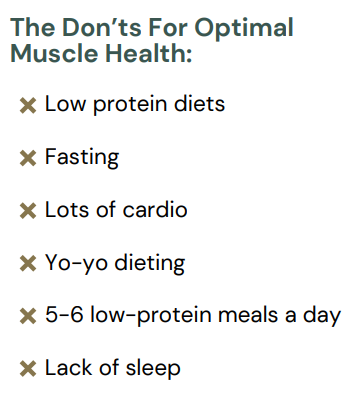Prior to the summer, I had been doing a lot of research around the importance of protein in our diets. I had become a big fan of Dr. Gabrielle Lyon's ideas of Muscle-Centric Medicine, and decided to participate in her 6-week bootcamp which included recommendations on diet, lifestyle and exercise.
There were many important takeaways from this 6 weeks of learning, and below I am sharing some of the key principles of why protein is such an important part of a healthy lifestyle, especially as we age and enter the perimenopause and menopause phases of life.
According to published peer-reviewed research from the Division of Endocrinology and Diabetes, Department of Medicine, University of Southern California, "Muscle mass decreases approximately 3–8% per decade after the age of 30 and this rate of decline is even higher after the age of 60. This involuntary loss of muscle mass, strength, and function is a fundamental cause of and contributor to disability in older people."1
Dr. Lyon says, "As the largest organ in your body, your muscular system is your metabolic currency, your reservoir for amino acids, and it plays a vital role in fighting inflammation throughout your body."
Dr. Gabrielle Lyon's Muscle-Centric Medicine framework focuses on preventing and reversing this decline in muscle mass as we age. Her framework emphasizes the vital role of muscle health in overall well-being, extending beyond strength and mobility. Muscle acts as a metabolic engine, amino acid reservoir, and plays a critical role in inflammation regulation and glucose metabolism.
She discusses the importance of Protein as a Cornerstone. Protein is fundamental to all cellular functions, encompassing much more than just muscle building. It is essential for the structure, function, and regulation of all tissues and organs, including muscle. Dr. Lyon emphasizes the importance of understanding amino acids, the building blocks of protein, to build a balanced diet.
So how much protein should we be focusing on in our daily diets? According to Dr. Lyon, we should all be prioritizing protein based on your ideal body weight (1 gram per pound). This recommendation contradicts outdated government guidelines focused on a percentage of calorie intake. The 1g per ideal body weight recommendation ensures sufficient protein even in a calorie deficit.
Understanding this requirement for maintaining healthy muscle mass, I wondered - If I hit this protein goal, can I eat whatever else I want? The answer is definitely not. Hitting this protein goal doesn't then allow you to eat unlimited amounts of fat, sugar, and processed junk! Not if you want to maintain a healthy body with low inflammation and optimize your healthspan. The bootcamp helped me to instead calculate my ideal macro consumption based on my goals and calorie intake.
This calculation included a Carb-to-Protein Ratio: For metabolically healthy individuals, a 1:1 carb-to-protein ratio is recommended, with a maximum of 40 grams of carbs per meal to manage insulin response. Adjustments are needed based on activity level and health conditions. Additionally, it was suggested to fill remaining calories with healthy fats, easily achieved through regular food choices. The higher caloric density of fats compared to carbs is important to consider for volume and satiety, especially during calorie restriction (if the goal is weight-loss without sacrificing muscle mass composition).
It was helpful to have some quick Do's and Don'ts for Optimal Muscle Health:


If you'd like to learn more about creating a stronger, healthier body through perimenopause and beyond, reach out to me by emailing payal@arorawellness.com.
Sources:
1. https://pmc.ncbi.nlm.nih.gov/articles/PMC2804956/
